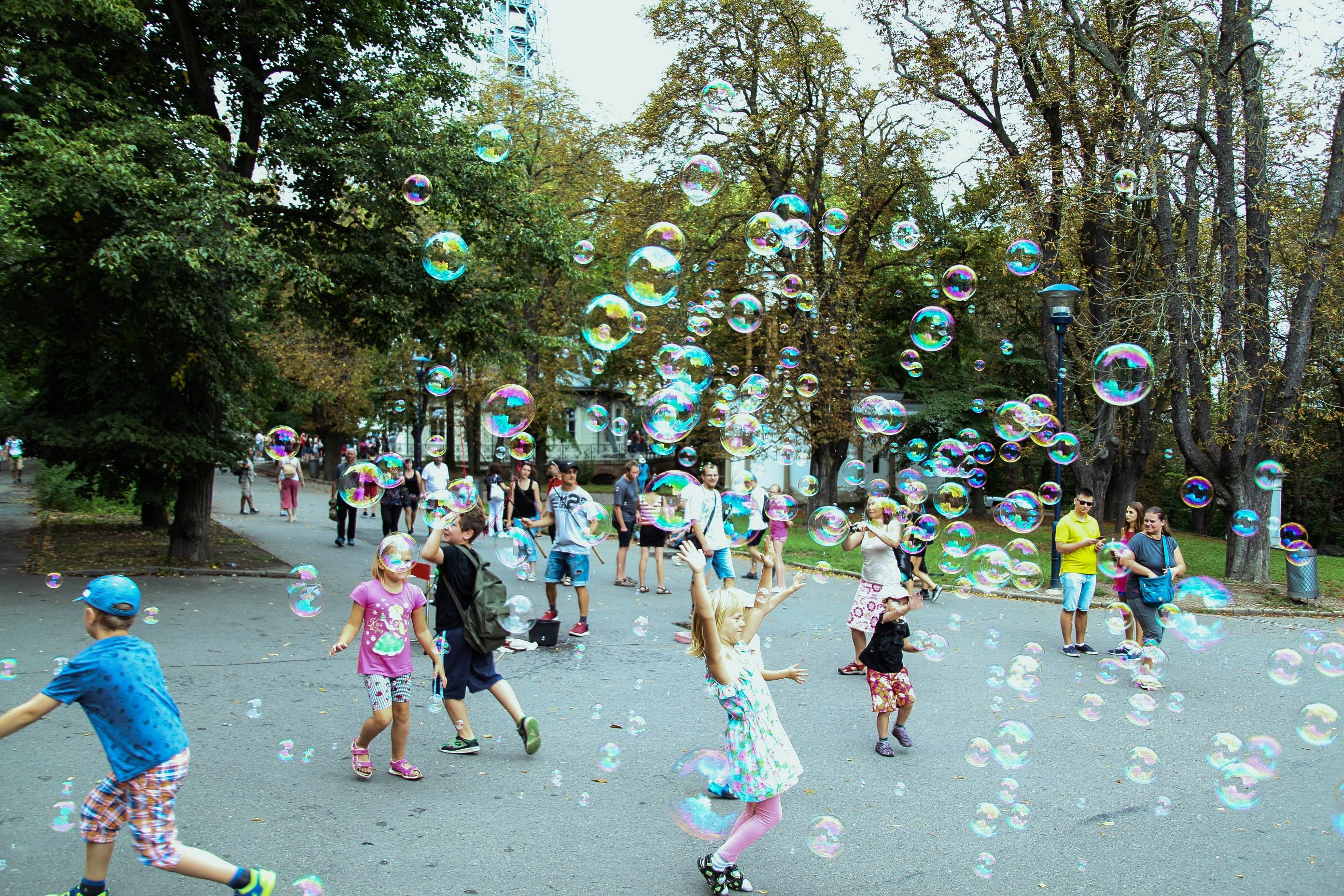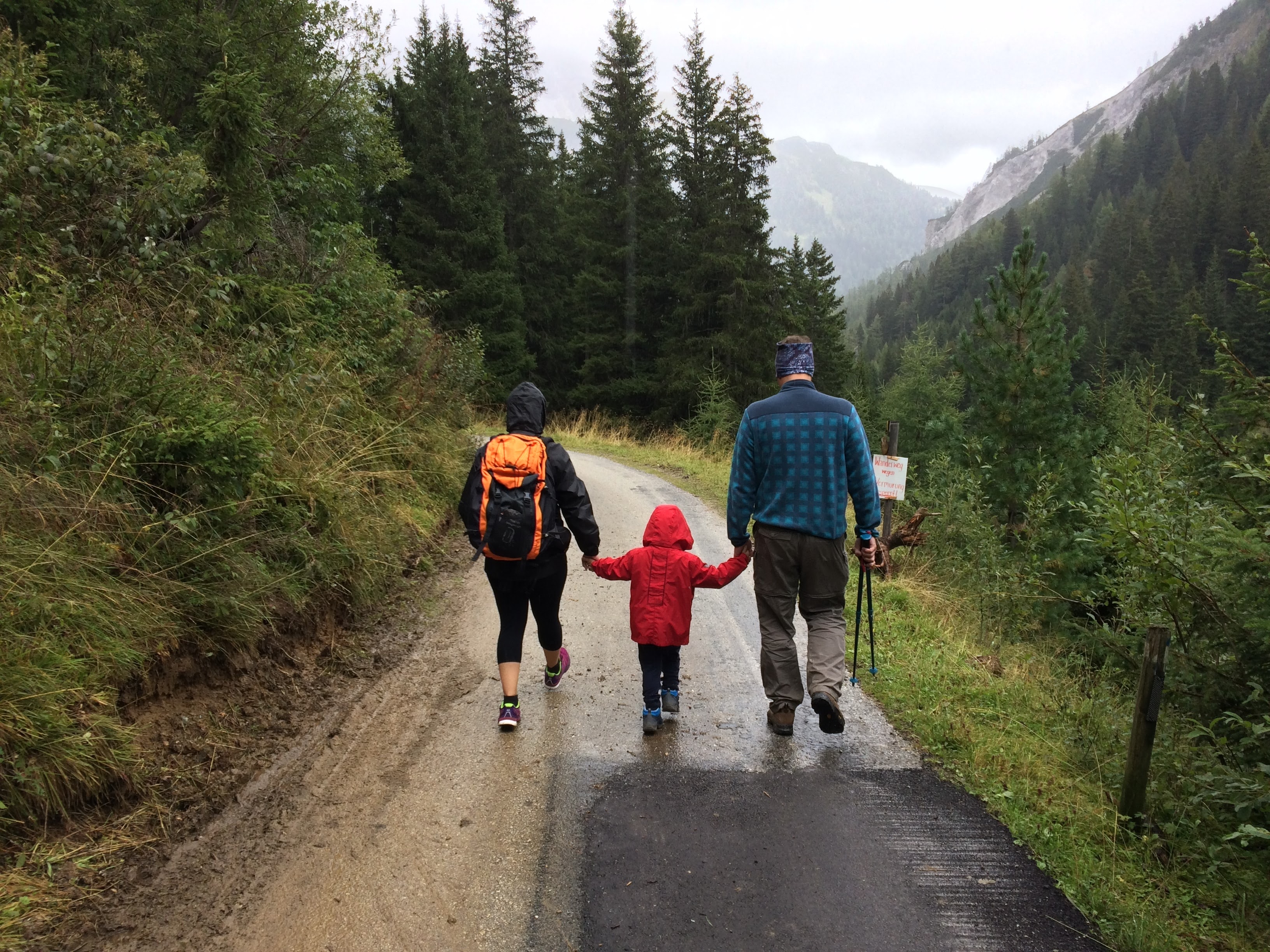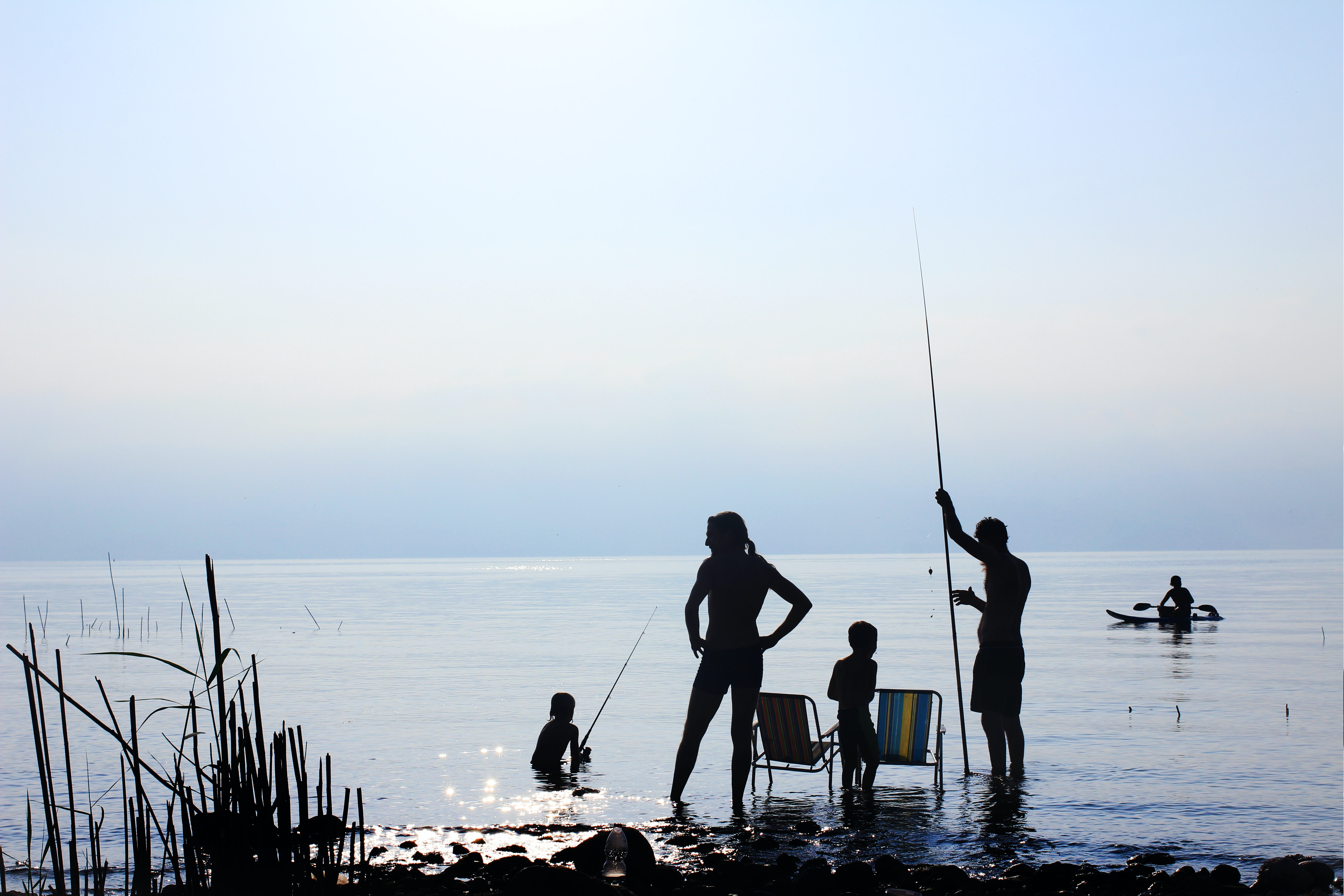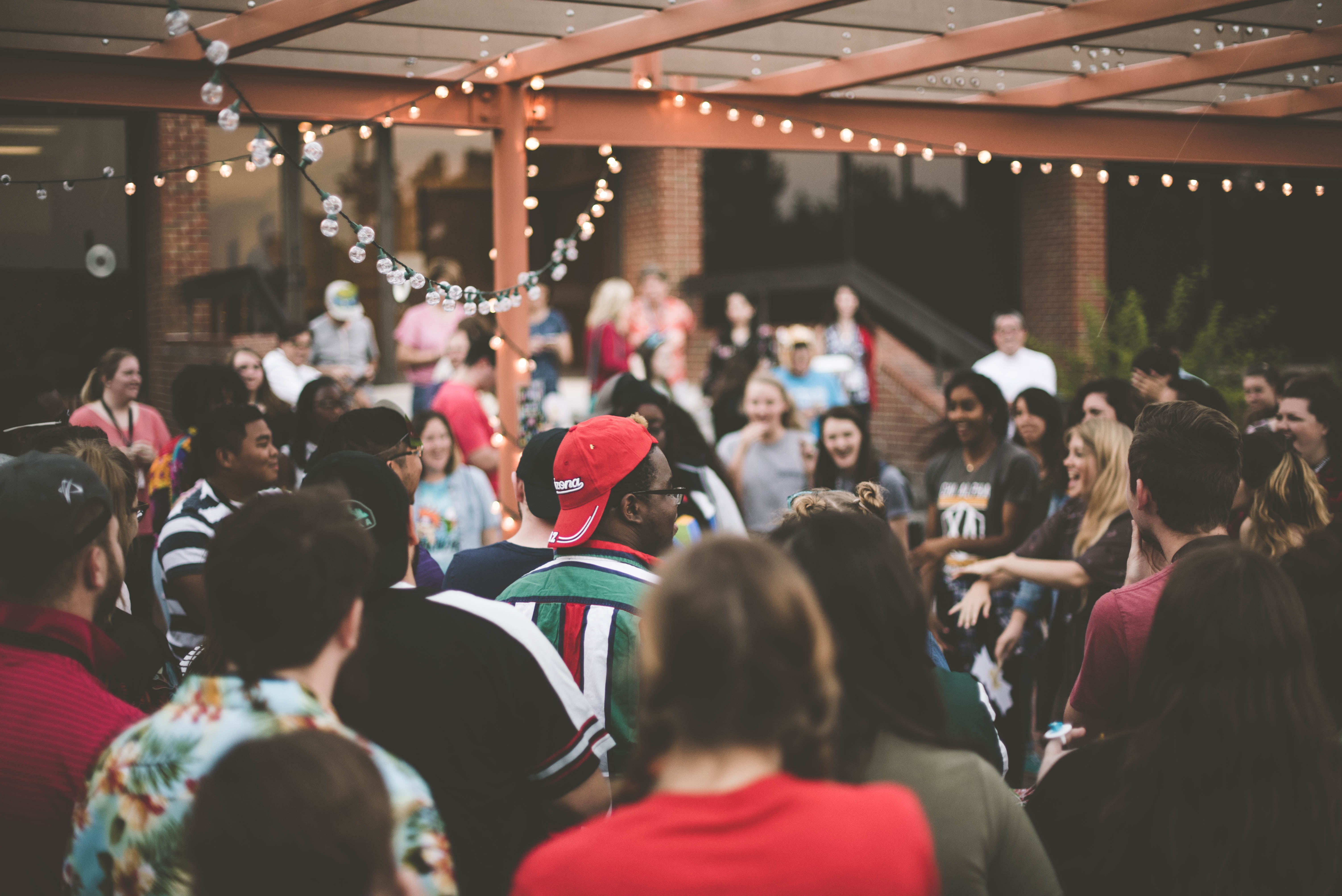We don’t stop playing because we grow old; we grow old because we stop playing.
George Bernard Shaw
Excerpted from Happy Now by Courtney Ellis
As a little girl, growing up in the northern woods of Wisconsin, I played in our yard with knobbly toads I found hopping around the ferns, content with only my kiddie pool and the shaggy, evergreen forest that surrounded me. I remember the smell of grass and earth, the white glow of the birches in the sun of late afternoon, the breeze stirring their leaves to flash and spin. My parents barely had two quarters to rub together, with my dad funneling everything they had into a fledgling business, but I never knew it. In the summers, it was all forests and toads. In the winters, I stomped around our tiny kitchen in purple Cabbage Patch snow boots singing Frosty the Snowman, eating raw cookie dough, and watching the snow fall while the white-tailed deer meandered around the yard. My parents read me library books and trotted out the same, worn game of Candyland, and we laughed and laughed.
Even in lean seasons, kids pick up quickly on rhythms of play. Often what parents remember as achingly stressful times, kids experienced as deeply joyful. Author Shawn Smucker shared the story of his preschool-aged son Leo who, weeks into their state’s pandemic stay-at-home orders, responded not with frustration or fear but in the following way:
After I helped him out and he washed his hands and we were leaving the bathroom, he looked up at me and said, in his most sincere voice, “Dad, I love this day.”
Why would he say that?
Why wouldn’t he say that? We have plenty of food. He’s getting to spend time with the whole family, as much time as he wants. We go to the park. We play more games than usual. We’re eating dinner together every single night. He has his own personal butt-wiper.

I love this day.
This day. This day of uncertainty and viruses and plunging markets and economic shadows and elections and books to sell and all of that.
I love this day.
No wonder Jesus invites us to come to him as children—unafraid, unashamed, and unencumbered by burdens that are out of their control anyway. In embracing our dependence on him, we are freed to live in the playful, trusting joy of belonging to him. There is a simplicity to this joy, not because it isn’t weighty, but because it is so profoundly good and true. When we give ourselves permission to be kids again, playfulness abounds.
Tom Junod was a young journalist when Esquire assigned him a piece on Fred Rogers, the Presbyterian minister-turned-television-host who dedicated his life to teaching everyone he could about the importance of this childlike posture toward ourselves, each other, and the divine. Writes Junod, “[Mr. Rogers] wanted us to remember what it was like to be a child so that he could talk to us; he wanted to talk to us so that we could remember what it was like to be a child. And he could talk to anyone, believing that if you remembered what it was like to be a child, you would remember that you were a child of God.”[ii] In the years since I’d outgrown my purple snow boots, my heart had lost my grasp on this truth—that I was, at my core, a child beloved by God and my life, and all its circumstances, rested squarely in his care. That each of us is held in just as tender a way. As I slowly began reawakening to this belovedness, a vital shift began to happen.
It’s hard not to live playfully when you know, deep down, how loved you are.
Playfulness invites us to take delight in the moment that’s right in front of us, remembering that we are loved. It gives us permission to be silly, have fun, and enjoy simple pleasures.
Good Medicine
Kids can be a conduit for joy: particularly for those who aren’t already caring for children on a daily basis. Our church serves an assisted living facility right across the street, and nothing lights up the residents there like a child. Youthful joy is a beautiful gift. It isn’t just older folks who benefit from being with children, though. One of our most beloved babysitters occasionally texts me to ask if she can come over to snuggle our kids.
“No offense,” she once told me, “but holding your baby is better than a therapy dog.” Perhaps nothing helps us learn how to accept the invitation to be a kid again better than being in the presence of children.

A couple of years ago, I went to a doctor’s visit with a friend. She was facing a scary diagnosis and needed some distraction, so we drove to Los Angeles together: her and me and then-eighteen-month-old Wilson. When she was called back for her appointment, he and I stayed out in the waiting area, passing the time. He quickly grew tired of the few board books I’d stashed in his stroller and squirmed out of my arms to roam the room.
My friend’s doctor shared her waiting area with a chronic pain clinic. An elderly man and his wife sat a few chairs over from Wilson and me, her body frail and still, each small movement clearly causing her anguish. I did my best to keep Wilson away from them; he was at that veer-and-crash stage of toddlerdom when kids reel around like drunken sailors on stormy seas. Plus, he was a particular bruiser of a child, more likely to run a person over than to stop short.
But toddlers be toddlerin’, and before I could stop him, he grabbed a small, yellow Nerf ball from his stroller and walked over to the man. Wilson studied him for a second, taking in his weathered, wrinkled skin, his pristine grey fedora, and his vacant expression. Then Wilson presented him with the ball, palm up, with a grin. I held my breath, ready to intervene and apologize.
Silently the man lifted the ball from Wilson’s outstretched hand, placed it on the curved arm of his chair, and gave it a nudge. It rolled down the curve and bounced to the ground at Wilson’s feet. Wilson’s mouth fell open wide. Eyes alight, he grabbed the ball from the floor and presented it again. The man’s downturned mouth flipped into a smile.
For the next twenty minutes, Wilson and the man played ball in the waiting room without speaking a word: rolling the ball, balancing it, giggling together when it bounced under a chair. The other people waiting for their appointments watched and smiled. The mood in the room lightened. Suddenly we were all together in this game—the two who played and the rest of us as viewers, co-conspirators instead of strangers. Wilson and the man played until the man’s wife was called in for her appointment. When they rose to go in—the wife leaning heavily on her husband’s arm, moving gingerly, each step a struggle—the man paused to lean down to Wilson and tip his hat.

“Thank you,” I whispered. He nodded to me with a smile, and then they were gone.
Wilson returned to me and curled up in my lap, ready now for a story and a snuggle, the ball gripped firmly in his little hand, unaware of the joy he’d ministered to everyone in that waiting room, the permission he’d given each of us to play.
Free to Play
My childhood was largely filled by wandering in forests and snowbanks, baking and crafting and creating masterpieces with paint or markers or modeling clay. I read absolutely everything I could get my hands on, including cereal boxes and shampoo bottles. My parents drove my sisters and me to soccer games and hockey practice and enrolled us in piano lessons and took us on some epic trips, but they also just let us be. A lot. It was glorious. Many of my best memories involve slow afternoons when I’d be free to putter about with a stack of books, a tin of colored pencils, a bin of Legos, or some butter, sugar, and eggs while Mom prepped dinner or worked in the garden. In the summer, I swam in the lake. In winter, I read, begged my mom for access to her glue gun and sewing scissors, and watched falling snow landing soft and feathery or wet and heavy. There was space to breathe, to create, to ponder, to dream. One of our great modern tragedies is that this is generally not how childhood works anymore. It’s bad enough that we adults struggle to embrace playfulness; we now struggle to let even our children embrace childlike play.
Pamela Paul, author of Parenting, Inc. notes that for today’s kids, “Every spare moment is to be optimized, maximized, driven toward a goal.” There is little room for free play or the creativity that arises when there is space enough to reflect and dream. As Clair Cain Miller wrote in “The Relentlessness of Modern Parenting,” parents believe that “children who were bored after school should be enrolled in extracurricular activities, and that parents who were busy should stop their task and draw with their children if asked.” I live in Orange County, California, one of the parenting-pressure capitals of the western world, where child enrichment activities are as ubiquitous as traffic jams and kale smoothies. Our family regularly seek to integrate free play not just into our children’s lives but into our adult ones as well. But it’s countercultural, to be sure. When I mention to people that one of our family values is allowing our kids to be bored, I get audible gasps. How dare we!

But the commercialized, pressure-filled culture of the day is unhealthy for both parents and children. Notes David Elkind, “Hyperparenting, overprotection, and overprogramming interfere with the healthy interaction of play, love, and work, and with the learning that accompanies their interplay.”[xi] Peter Gray notes that the most successful childhood play is self-chosen and self-directed and that “free play is also nature’s means of helping children discover what they love.”[xii] Without the opportunity to explore their world and notice what piques their interest, children can grow up stunted, like a plant kept in a dark room. Kids require lots of space and time to make messes, try new things, and experiment with their environment. Offering unstructured time to our children is one of the greatest gifts we can give them.
This can be difficult, of course, both because it is becoming quite countercultural to not either put our children into constant enrichment activities or allow constant screen time, and because children with unstructured time often make big messes and get into quarrels with one another. As a parent, I struggle to be patient with either of these things, but I also know that even the messes and the quarrels are teachers of one kind or another. When the pandemic hit and we faced weeks (and then months)of stay at home guidelines, we all had to give in to the mundane beauty of the same old things, day after day. We struggled mightily, but then we slowly, and sometimes painfully, began to discover new appreciation for what we already had and new appetites for creative play.
“I’m turning into you,” I told my mom one day over a video chat, holding an egg carton and a paper towel tube up to the screen. “I’m saving garbage for the kids. And you were totally right—they love playing with it.”
We don’t need to cram managed activities into our children’s every waking hour or to entertain these precious years away with television and apps. (Though both television and apps can certainly be a saving grace from time to time—no shame there!) And here’s the wider lesson, applicable to parents and non-parents alike: we mustn’t cram managed activities into our every waking hour or entertain our lives away with television and apps. Freedom and discovery are wonderful fuels for happiness. Sometimes space and silence are the best teachers of all.

What is it that you loved to do when you were a child? What brought you joy in your earliest years? Perhaps you can welcome that activity back into your life today. Pick up a new journal, join a soccer league, paint a picture, or fly a kite. After I mentioned how much I’d loved riding horses as a kid, Daryl encouraged me to take lessons again. I rode my first Tennessee Walking Horse a few weeks later, and the little six-pack of lessons we purchased infused joy for weeks.
As we accept the playful invitation to be a kid again—giving ourselves permission be discoverers of the world, in touch with the holy present—happiness arrives at our fingertips. We begin to drink from the “river of delight” of which the psalmist writes.
Let us never forget God’s invitation to us to come to him as little children, open to love and wonder. Open to joy.
Perhaps it’s time to make that paper airplane?
Accept the invitation: Be a kid again.

Happy Now by Courtney Ellis
It’s time to get serious about playfulness!
When was the last time you felt really, truly happy? If you’ve ever longed to leave your exhausting days and fretful nights behind, look no further. Courtney recounts a courageous—and often hilarious!—experiment in joy and delight as she awakens to the truth that God doesn’t just want us to be holy, but happy, too!
A whimsical storyteller who combines witty humor and engaging research with unfettered honesty, in Happy Now Courtney Ellis is a wise guide on an uplifting journey from sad to spirited. You’ll discover there is almost nothing that playfulness cannot make a little bit better, a little bit easier, and a lot more fun. Lift your mood, lighten your load, and renew your spirit with the power of playfulness.
Happy Now: Let Playfulness Lift Your Load and Renew Your Spirit is a rollicking, investigative, and thoughtful invitation to open ourselves to the joy and freedom of play all over again. It is designed to invite readers to let go of their most serious selves, grant them permission to engage in curiosity and wonder of all kinds, and delight in the release of its transformative effects: creativity, innovation, delight, rest, and—above all—a more trusting relationship with Jesus.
Through wry observations, firsthand experience, Scriptural study, and broad research, Ellis addresses questions like: How does God invite us into play? What does it mean that we are created for curiosity? In what ways can wonder help us love our neighbors more fully?
The world can be a serious place. Because of Jesus, Christians don’t need to be. Dive deeply into the waters of whimsy, embracing the joy God offers. Sometimes that looks like welcoming holy laughter. Other times it’s learning to see mistakes as learning and innovation rather than mess-making. Play brings about transformation and rest and praise. And isn’t that just the reason God created us?






